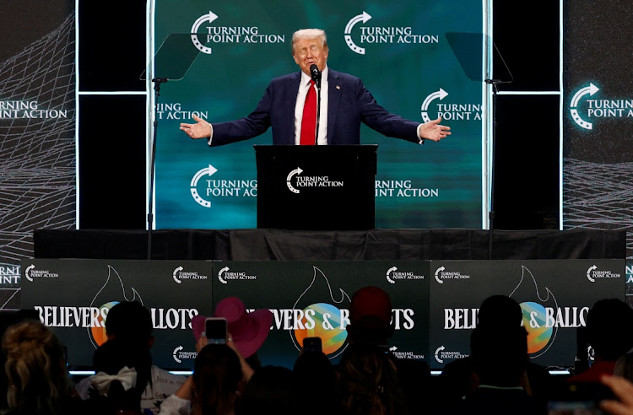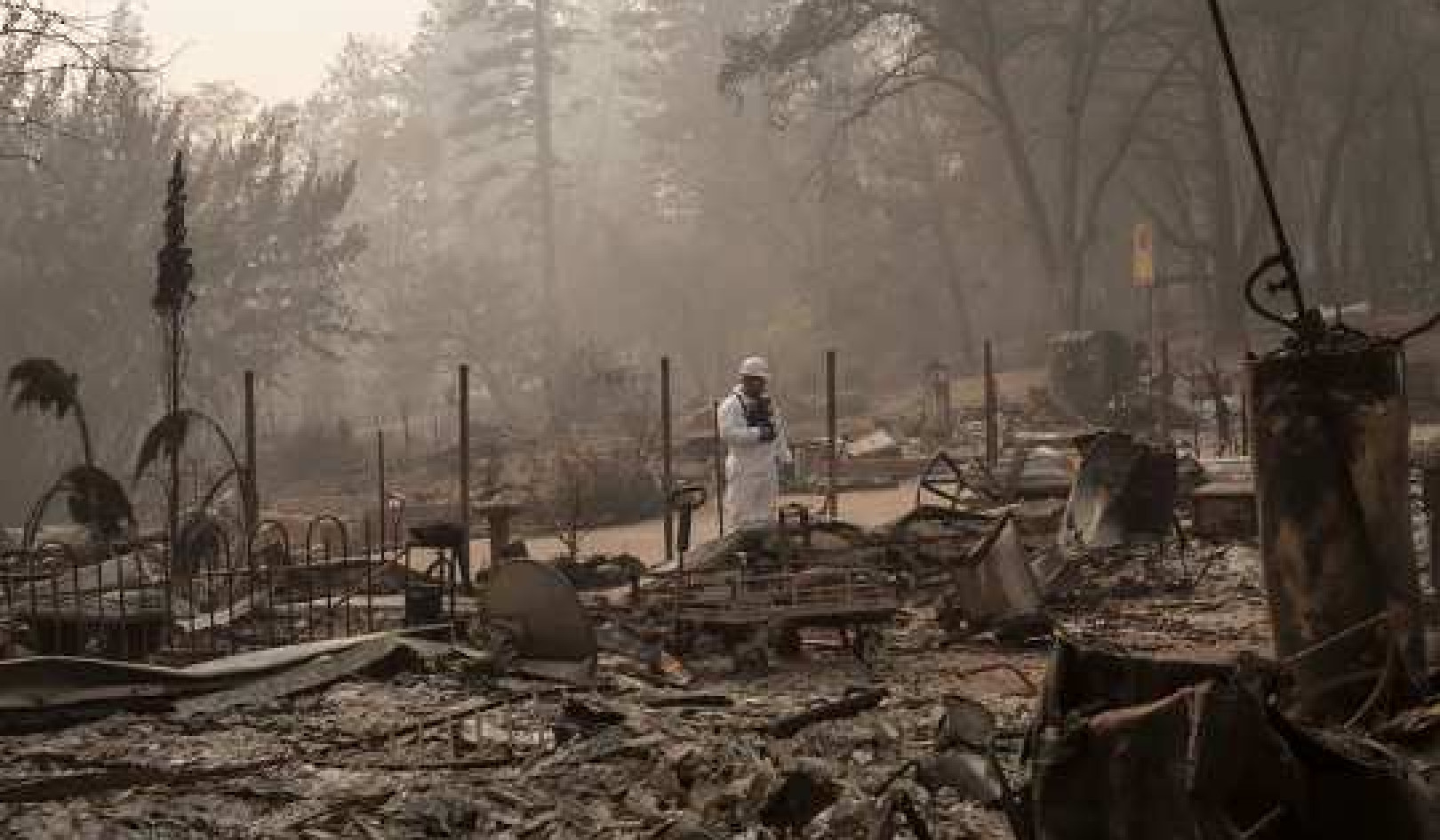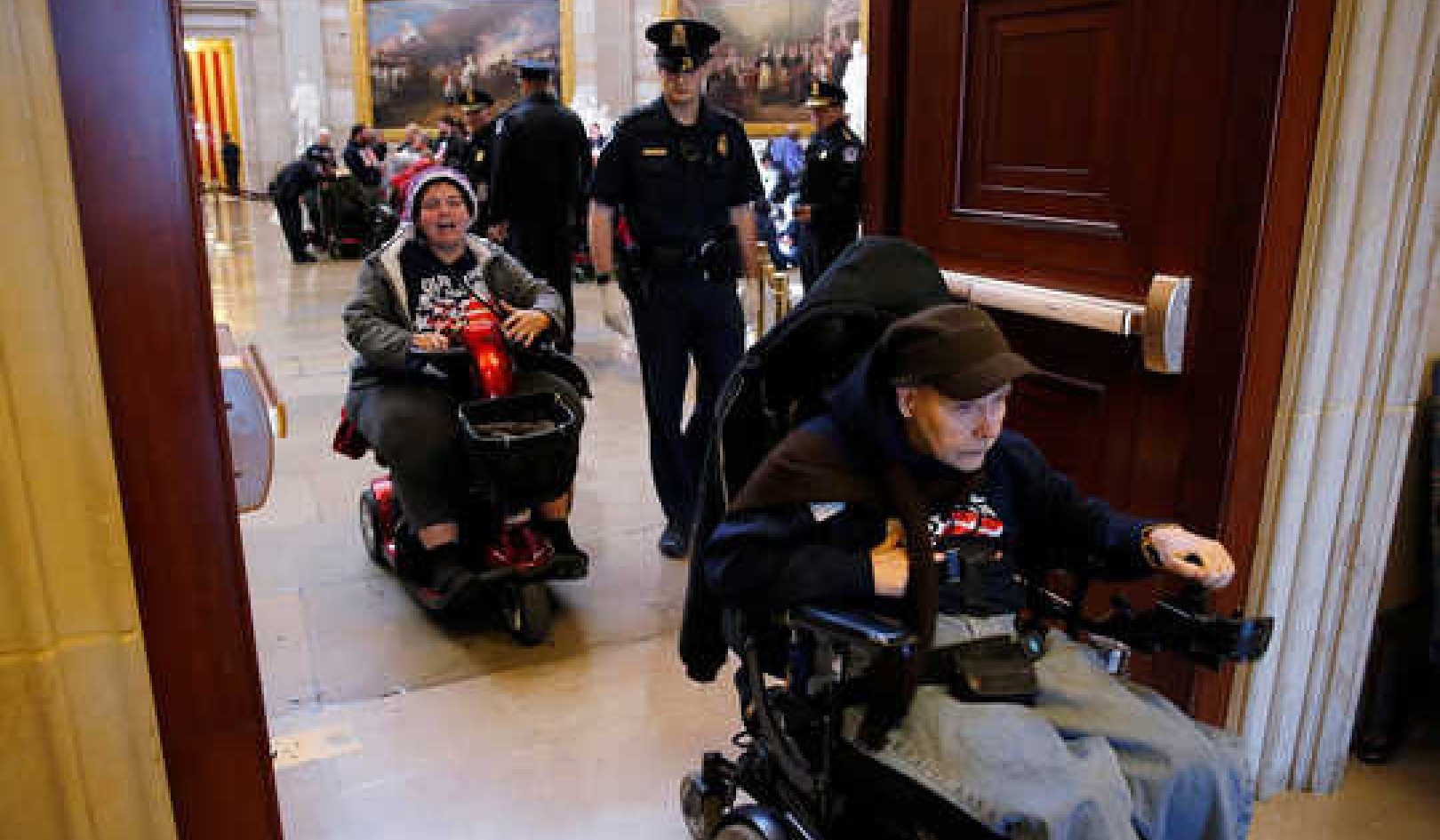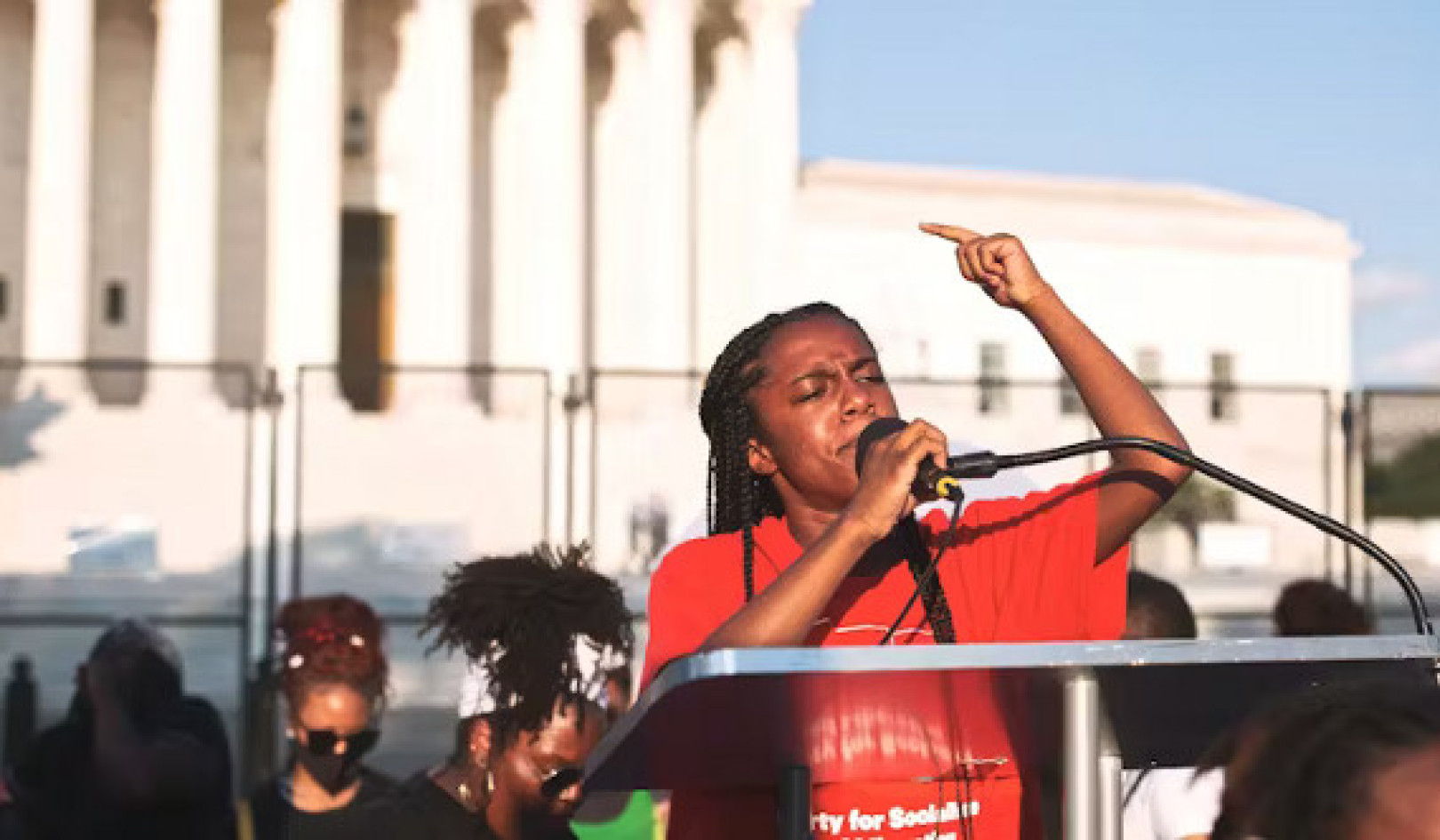
In this Article:
- What did Trump say at the Believers Summit?
- How does Project 2025 propose to change voting rights?
- What are the historical tactics of voter suppression by the GOP?
- How does modern technology affect voter suppression?
- What can be done to protect voting rights?

The Republican Strategy to Win In 2024
by Robert Jennings, InnerSelf.com
Former President Donald Trump addressed a crowd at Turning Point Action's "The Believers Summit" in West Palm Beach, Florida, on July 26, 2024. Trump urged Christians and NRA members to turn out in force for the upcoming 2024 election, emphasizing their crucial role in achieving a landslide victory. He framed the election as a pivotal moment for the country, suggesting that a failure to vote would result in losing the chance to "make America great again."
Most strikingly, Trump asserted that if his supporters voted and secured a victory, they would "never have to vote again." This alarming statement underscores a broader narrative of voter mobilization and suppression that has deep roots in American history and represents a direct threat to democracy.
Trump's Speech and Its Implications
Christians and NRA members form two critical demographics within the Republican base. In his speech, Trump criticized the Biden administration without evidence, claiming it had weaponized law enforcement against Christians and pro-life activists. Trump promised to address these issues if re-elected, including reviewing cases of political prisoners and creating a federal task force to combat anti-Christian bias. This rhetoric highlights ongoing efforts to mobilize specific voter groups while implicitly suggesting that current voting systems are rigged or unfair.
Trump's call for a "landslide that's too big to rig" reflects a broader strategy employed by the GOP to secure electoral victories. His emphasis on early voting, absentee voting, and voting on Election Day underscores the importance of voter turnout in achieving these goals. However, his promise that his supporters would "never have to vote again" if they secured victory is deeply troubling. This statement implies a further intention to undermine the democratic process and suggests a move toward authoritarianism, where electoral processes could be manipulated or rendered obsolete.
Jim Crow Era and Dixicrats Tactics
The history of voter suppression in the United States is deeply rooted in the post-Reconstruction era, particularly in the Southern states. Jim Crow laws were enacted to enforce racial segregation and disenfranchise African American voters in the South. These laws, including poll taxes, literacy tests, and grandfather clauses, effectively prevented many African Americans from exercising their right to vote. These tactics were used to maintain political power and suppress the black vote.
One notable example of voter suppression during the Jim Crow era was the use of literacy tests. These tests were designed to be difficult and often included obscure questions that even highly educated white individuals would struggle to answer. Additionally, intimidation and violence were commonly used to discourage African Americans from voting. Organizations like the Ku Klux Klan played a significant role in enforcing these measures through fear and violence, further entrenching the disenfranchisement of black voters.
Transition to Modern Republican Tactics
The political landscape shifted significantly after World War II, particularly with the Republican Party's adoption of the Southern Strategy. This strategy aimed to attract disaffected white voters in the South who were unhappy with the Democratic Party's support for civil rights. Prominent Southern Democrats like Strom Thurmond, Jesse Helms, John Connally, and others switched to the Republican Party, symbolizing this shift. The GOP began to adopt and adapt voter suppression tactics to maintain political power.
Gerrymandering, the practice of drawing electoral district boundaries to favor a particular party, has been a key tactic used by the GOP. This practice has resulted in their gaining significant advantages in House elections, often leading to disproportionate representation. Several states have become infamous for their gerrymandering practices:
-
North Carolina: Persistent gerrymandering issues have plagued North Carolina, with maps repeatedly challenged and redrawn due to racial and partisan bias.
-
Texas: The state's 2011 redistricting plan was found to be discriminatory against minority voters. Despite court orders, Texas continued to face accusations of gerrymandering.
-
Pennsylvania: The 2011 map heavily favored Republicans, leading to a state Supreme Court ruling and the redrawing of more balanced districts in 2018.
-
Ohio: The 2011 map was one of the most gerrymandered in the country, leading to legal challenges and a federal court ruling declaring it unconstitutional.
-
Florida: The state's recent gerrymandering efforts have also drawn significant controversy. Following the 2020 census, Governor Ron DeSantis and the Republican-controlled legislature proposed new maps that heavily favored Republican candidates. Legal challenges are expected, as critics argue these maps undermine fair representation.
Voter ID laws have been another tool used to suppress voter turnout, particularly among minority and low-income voters. These laws require voters to present specific forms of identification, which many voters still need to possess. For example, Wisconsin's strict voter ID law was found to affect minority voters disproportionately, and a federal judge ruled that the law was intended to suppress Democratic votes.
Purging voter rolls or removing inactive voters from registration lists is another tactic used to suppress votes. Ohio implemented an aggressive voter roll purging policy, which removed voters who had not voted in recent elections and failed to respond to a notice. Critics argued that this disproportionately affected minority and low-income voters. The Supreme Court upheld the policy in Husted v. A. Philip Randolph Institute.
Polling place closures and reduced voting accessibility have also been used to suppress votes. In Texas, after the Supreme Court's 2013 Shelby County v. Holder decision, which struck down key provisions of the Voting Rights Act and allowed states to change their election laws without advance federal approval, the state closed hundreds of polling places, primarily in minority and low-income areas. Similarly, during the 2018 gubernatorial race in Georgia, multiple instances of voter suppression were reported, including the closure of polling places in minority neighborhoods.
The Role of Modern Technology and Social Media
Modern technology and social media have introduced new avenues for voter suppression. Misinformation campaigns, often spread through social media platforms, have misled voters about voting procedures, dates, and eligibility. Intimidation campaigns, sometimes orchestrated online, have targeted minority communities, discouraging them from voting through threats and false information.
Despite the persistent challenges of voter suppression, advocacy groups and legal organizations have not wavered in their efforts to combat these discriminatory practices. These groups have played vital roles in protecting and preserving voting rights through sustained legal challenges, public awareness campaigns, and grassroots organizing. For instance, the redrawing of Pennsylvania's congressional districts in 2018 directly resulted from these efforts to challenge gerrymandering.
Project 2025 and Its Impact on Voting Rights
Project 2025, spearheaded by the Heritage Foundation and supported by over 100 conservative organizations, outlines a comprehensive policy blueprint for the next conservative administration, potentially led by Donald Trump. This initiative includes proposals critics argue could undermine voting rights and election integrity.
These plans are: to raise campaign contribution limits, increase money's influence in politics, and remove critical election security functions from the Cybersecurity and Infrastructure Security Agency (CISA), weakening federal support for state and local election security efforts. Additionally, Project 2025 proposes adding a citizenship question to the 2030 census, a move likely to undercount immigrant populations and skew political power in favor of conservative areas.
Furthermore, Project 2025 aims to roll back federal efforts to expand voting access by potentially rescinding Executive Order 14019, which seeks to increase voter registration and participation, particularly among marginalized groups. This rollback could lead to decreased support for initiatives that make voting more accessible, such as language assistance, support for individuals with disabilities, and enhanced voter education. These proposals reflect a continuation and intensification of long-standing voter suppression tactics, posing significant challenges to the democratic process and highlighting the need for vigilance and advocacy to protect voting rights for all citizens.
Recent Developments and the 2024 Election
By urging Christians and NRA members to vote in large numbers, Trump is mobilizing critical demographics within the Republican base. His emphasis on a "landslide that's too big to rig" reflects a strategy aimed at overwhelming the voting system to ensure a Republican victory even though there has not been any credible evidence of vote rigging by Democrats.
However, his promise that his supporters would "never have to vote again" if they secured victory is typical for Republicans who have suppressed the vote or "rigged the elections." This statement implies a Republican intention to undermine the democratic process in 2024. It further suggests Republicans are moving toward authoritarianism, where electoral processes could be manipulated or rendered obsolete.
The recent Supreme Court ruling granting the president virtually unchallenged immunity for official actions has significant implications for future elections. This level of immunity can undermine checks and balances, as it may encourage presidents to act without fear of legal repercussions, potentially eroding the rule of law related to future elections. This ruling, combined with aggressive voter suppression tactics, could further entrench political power and undermine democratic processes.
Suppose Trump loses the Electoral College in 2024. In that case, there is concern that the GOP might attempt to contest the results in some Republican-controlled states, potentially throwing the election into the House of Representatives. In such a scenario, Republicans, who control more state delegations, could use their advantage to secure a victory for Trump despite losing the actual vote. This potential outcome draws a parallel to the 1876 election, where contested results led to a vote in the House, the presidency of Rutherford Hayes, the second-place finisher, and the beginning of Jim Crow laws.
The history and evolution of voter suppression in the United States reveal a persistent effort to manipulate electoral outcomes. From the Jim Crow era's blatant disenfranchisement to modern tactics like gerrymandering, voter ID laws, and purging voter rolls, these practices have consistently targeted minority and Democratic-leaning populations. Trump's recent speech and the Supreme Court ruling on presidential immunity highlight the ongoing struggle over vote theft and the integrity of the electoral process.
Citizens, advocacy groups, and lawmakers must remain vigilant and actively work to protect voting rights. Public awareness, legal challenges, and grassroots organizing are essential to ensuring fair elections and upholding democratic principles. By staying informed and involved, individuals can help safeguard the integrity of the electoral process and prevent the erosion of democratic norms.
Article Recap:
Project 2025, a comprehensive policy blueprint by the Heritage Foundation, could significantly impact voting rights and election integrity, continuing a historical pattern of GOP voter suppression. This includes raising campaign contribution limits, altering election security measures, and adding a citizenship question to the census. Trump's recent speech and the Supreme Court ruling on presidential immunity further highlight the ongoing threats to democratic processes. Ensuring fair elections requires vigilance and advocacy.
About the Author
 Robert Jennings is co-publisher of InnerSelf.com with his wife Marie T Russell. He attended the University of Florida, Southern Technical Institute, and the University of Central Florida with studies in real estate, urban development, finance, architectural engineering, and elementary education. He was a member of the US Marine Corps and The US Army having commanded a field artillery battery in Germany. He worked in real estate finance, construction and development for 25 years before starting InnerSelf.com in 1996.
Robert Jennings is co-publisher of InnerSelf.com with his wife Marie T Russell. He attended the University of Florida, Southern Technical Institute, and the University of Central Florida with studies in real estate, urban development, finance, architectural engineering, and elementary education. He was a member of the US Marine Corps and The US Army having commanded a field artillery battery in Germany. He worked in real estate finance, construction and development for 25 years before starting InnerSelf.com in 1996.
InnerSelf is dedicated to sharing information that allows people to make educated and insightful choices in their personal life, for the good of the commons, and for the well-being of the planet. InnerSelf Magazine is in its 30+year of publication in either print (1984-1995) or online as InnerSelf.com. Please support our work.
Creative Commons 4.0
This article is licensed under a Creative Commons Attribution-Share Alike 4.0 License. Attribute the author Robert Jennings, InnerSelf.com. Link back to the article This article originally appeared on InnerSelf.com
Further Reading:
- https://www.aclu.org/news/voting-rights/how-donald-trumps-election-lies-and-other-anti-voter-policies-will-continue-to-impact-our-democracy
- https://www.aclu.org/publications/trump-on-voting-rights
- https://www.smithsonianmag.com/smart-news/confusion-voter-suppression-and-constitutional-crisis-five-things-know-about-1876-presidential-election-180976677/
- https://history.princeton.edu/about/publications/voter-suppression-us-elections
- https://en.wikipedia.org/wiki/Voter_suppression_in_the_United_States
- https://www.britannica.com/topic/voter-suppression

Related Books:
On Tyranny: Twenty Lessons from the Twentieth Century
by Timothy Snyder
This book offers lessons from history for preserving and defending democracy, including the importance of institutions, the role of individual citizens, and the dangers of authoritarianism.
Click for more info or to order
Our Time Is Now: Power, Purpose, and the Fight for a Fair America
by Stacey Abrams
The author, a politician and activist, shares her vision for a more inclusive and just democracy and offers practical strategies for political engagement and voter mobilization.
Click for more info or to order
How Democracies Die
by Steven Levitsky and Daniel Ziblatt
This book examines the warning signs and causes of democratic breakdown, drawing on case studies from around the world to offer insights into how to safeguard democracy.
Click for more info or to order
The People, No: A Brief History of Anti-Populism
by Thomas Frank
The author offers a history of populist movements in the United States and critiques the "anti-populist" ideology that he argues has stifled democratic reform and progress.
Click for more info or to order
Democracy in One Book or Less: How It Works, Why It Doesn't, and Why Fixing It Is Easier Than You Think
by David Litt
This book offers an overview of democracy, including its strengths and weaknesses, and proposes reforms to make the system more responsive and accountable.





























